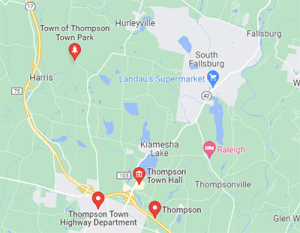|
RCBJ-Audible (Listen For Free)
|
Property Owners Challenge Town of Monroe on Capping Ownership of Residential Properties
 A group of limited liability companies that owns multiple residential rental properties in the Town of Monroe are suing the town over a law passed earlier this year that caps the number of residential properties a person or entity can own at three properties.
A group of limited liability companies that owns multiple residential rental properties in the Town of Monroe are suing the town over a law passed earlier this year that caps the number of residential properties a person or entity can own at three properties.
The law, encompassed in the Town Code, Section 40-22, provides: “It shall be unlawful for any one person or entity to own more than three residential rental properties within the Town of Monroe. Principals with common ownership in more than one entity owning or operating a residential rental property in the Town shall be considered to be one entity.”
The plaintiffs in the lawsuit, filed last month in U.S. District Court for the Southern District of New York, are identified as limited liability corporations. One individual, Pamela Lee, is identified by name as a member of those LLCs.
The plaintiffs, who say they are entitled to just compensation (of at least $7.26 million) to be determined at trial, are also asking for unspecified punitive damages, attorney’s fees, and any further relief that the court deems just and proper. They have also requested a jury trial.
The complaint alleges violations of the Fifth and 14th Amendments to the United States Constitution. It says limiting an owner to three residential rental properties deprives them of their fundamental property rights without just compensation.
The town law does not provide plaintiffs with a fair process to contest the restriction to rental of three residential properties, the complaint claims. Furthermore, it is “arbitrary and capricious” and lacks “a rational relationship to a legitimate governmental objective.”
According to the complaint, at the time the town law was enacted, plaintiffs had existing contracts with tenants for three or more properties and that the local law violates the contracts clause in the Constitution – Article I, Section 10, Clause I. The Contract Clause provides that no state may pass a “Law Impairing The Obligation Of Contracts.”
The complaint also alleges that by limiting the number of people who may occupy any one bedroom to two, the town law discriminates against families with children and is in violation of the Fair Housing Act. The section complained about reads, “It shall be unlawful for the occupancy of any one bedroom to exceed two persons.”
The plaintiffs are asking the court to prohibit the town from enforcing the law and to declare the town law unconstitutional and a violation of the Fifth and 14th Amendments and the contracts clause of the Constitution.
New York’s First Cannabis Growers Showcase Opens In New Paltz
 High Falls Canna, a family-owned cannabis cultivator in the Hudson Valley, hosted the first New York State Cannabis Growers Showcase on Thursday, August 10, 2023 in the New Paltz Municipal Parking Lot at 25 Plattekill Avenue in the Village of New Paltz.
High Falls Canna, a family-owned cannabis cultivator in the Hudson Valley, hosted the first New York State Cannabis Growers Showcase on Thursday, August 10, 2023 in the New Paltz Municipal Parking Lot at 25 Plattekill Avenue in the Village of New Paltz.
The market will operate weekly, Thursday to Friday from 4 p.m. to 8 p.m. and on Saturday from 1 p.m. to 8 p.m. Participating growers, processors and retail dispensary licensees are Essential Flowers / Legacy Dispensers, Oak Queen Farms, High Falls Canna, Empire Farm 1830, Hudson River Hemp and NOWAVE LLC. The market will close after a retail dispensary is up and operating legally in the Village.
About 200 potential customers were lined up in the pouring rain at the opening of the market, hoping to purchase cannabis at the only legal sales outlet in the Hudson Valley.
The Cannabis Growers Showcase initiative is a partnership that enables cannabis growers and existing, licensed retailers to sell cannabis to consumers. New York State is the first in the nation to allow the sale of cannabis at state and locally sanctioned locations. Learn more about the program here.
Viznitz Hasidim in Sullivan County Trying To Create Village On Nearly 1,000 Acres
 A Viznitz Hasidic community is trying to create its own village on a 1.5-square-mile piece of land that includes hundreds of acres of unspoiled woods mostly in the Town of Thompson and partly in Fallsburg. The village of Ateres would be self-governed, particularly on shaping the future of its development.
A Viznitz Hasidic community is trying to create its own village on a 1.5-square-mile piece of land that includes hundreds of acres of unspoiled woods mostly in the Town of Thompson and partly in Fallsburg. The village of Ateres would be self-governed, particularly on shaping the future of its development.
The proposal, which is before the town boards, has divided the community between those who support it and others who oppose it. Thompson Supervisor Bill Rieber and Fallsburg Supervisor Katherine Rappaport have to decide if the Viznitz request is legal before scheduling a public referendum.
The Ateres petition, filed on June 14, demarcates an area of 929 acres on the north side of Route 17, not far from the Resorts World Catskills casino and nearby Kartrite Resort & Indoor Waterpark. Much of the land is undeveloped. The acreage includes a small neighborhood where the Vitznitz community began settling two decades ago. An estimated 140 families live there now. The group in 1992 founded a yeshiva in the former Gibber Hotel, part of the former Borsht Belt resorts.
Some 834 people, more than half of them children, live in the proposed village, according to the petition. That satisfies one of New York’s few requirements for a new village: that it must have at least 500 regular inhabitants. Only 322 potential Ateres residents are 18 or older and qualified to vote. This is the second time Ateres has proposed the creation of a village.
The group has said it wants to establish a village to meet the community’s needs, stressing the addition of sidewalks and street lighting for residents who walk on the roads on Friday nights.
The Thompson supervisor is among many who believe the founding of a village will lead to the kind of development seen in dense villages such as Kiryas Joel in Orange, and New Square and Kaser in Rockland.
New York has about 535 villages, but there’s been a recent trend to dissolve villages. The purchase of Nyack College in the Village of South Nyack led to the dissolution of the village.
Rieber and Rappaport plan to continue the Ateres petition hearing at the Viznitz synagogue on Aug. 22. Once the hearing is closed, the supervisors have 10 days to decide if the petition is valid. If rejected, petitioners can correct the flaws and submit a new one. If approved, the supervisors must allow 30 days for a legal challenge and then schedule a referendum if there are none.
Meanwhile, two state bills are pending that could derail the Ateres petition and a Hasidic village proposal in Orange County, by raising the population threshold for new villages to 2,000 and setting other new rules. Both bills were approved by the Legislature in June and are awaiting Gov. Kathy Hochul’s decision to sign or veto them.













